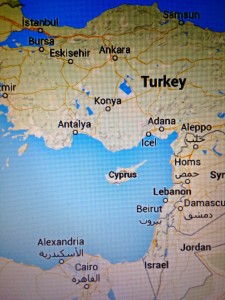So 2 weeks ago I spent 9 days in Cyprus. It was a place I had wanted to visit when I was in Saudi Arabia last time, but never had the chance. Cyprus is an island in the Mediterranean Sea that neighbours Turkey, Syria, Israel, Lebanon, Egypt and Greece. Even though it is geographically close to these conflict areas, the island itself is actually quite safe. Petty crime and such are said to be on the rise related to recent economy issues. Its economy (at least in the southern part) is largely tied to Greece.
Cyprus has a sorted past. In the early 1900s it was a crown colony with ties to Britain. In 1960 it became the Republic of Cyprus and the government at that time needed to allocate a certain percentage of its seats to Turkish Cypriots. This led to internal strife between the Greek Cypriot majority and the Turkish Cypriot minority, so in 1964 UN peacekeepers were brought in. They are still in place. As a side note, we actually met a group of them out at a pub while we were in Nicosia. In 1974 Turkish forces invaded the northern part of the island, resulting in the displacement of huge numbers of Cypriots. It’s understandably been a point of contention ever since. Well, at least for the Greeks. Most of the Turkish we spoke to had no bad feelings towards the Greeks, and the word “peace” was mentioned several times. We met several people on both sides who’s families were greatly affected by the 1974 invasion. Our Airbnb host in Limassol’s family lived in North Nicosia, but was originally from Greece and so her family lost the home they owned and essentially had to start over. Same goes for a cafe owner we met in North Nicosia. His family was Turkish but had owned property in the south which they lost and had to start over on the Turkish side. Even though these events happened 40 years ago, for many people it is like it was yesterday. Spending time here made me reflect on how hard it is to imagine what it would be like to lose your house, possessions, neighbours, your whole life really, overnight. What it would be like to be striped of all your worldly possessions and having to start over.
After the 1974 Turkish invasion a UN Buffer Zone was established and monitored by UN peacekeepers. This basically entailed the formation of the Green Line which stretches 180km across the northern part of the island. It dissects through the capital city Nicosia. The border remained closed until 2003 when Greek Cypriots were allowed to cross into the north. I really loved the city of Nicosia, and we crossed into the north via the Ledra Street crossing several times during our stay there. This was an interesting experience as you walked through the DMZ (demilitarized zone or Green Line) to get back and forth. We were given a map of Nicosia at our hotel in the southern part of the city and it was very intriguing as it was basically blank on the map once you crossed into the north. All that was noted was that it was Turkish occupied territory since 1974. No street names. It reminded me of how I once bought a world map in Saudi Arabia and the country of Israel wasn’t identified. It was just left blank, almost as though it also didn’t exist.
So that’s my basic uneducated version of the history of Cyprus. Over the next couple weeks I’ll blog more specifically about what we saw and did while in Cyprus, as well as tell you a fabulous tale of that time a stranger lent us his BMW for 50euros so we could tour around the northern part of the island. It’s a really good story, and one that I’m really looking forward to sharing with you. On the 10th of March I’m heading to Copenhagen and spending 2 weeks hunting down the northern lights in Norway, Sweden and Finland. This has been a long standing dream of mine, as I’ve never seen the northern lights. I’m really, really excited to photograph them! More to come……
